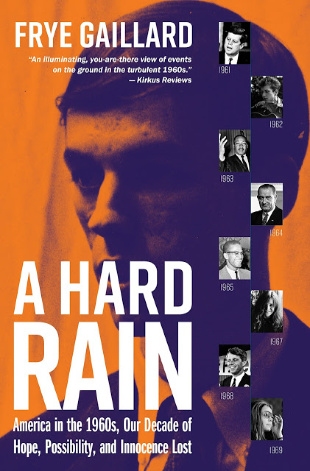Frye Gaillard is an award-winning journalist with more than 20 published works on Southern history, race relations, and journalism. Writer-in-residence at the University of South Alabama, he has come up with an amphibian approach to the complex and compelling decade of the 1960s. On the one hand, he walks us through this dense and tumultuous period of history beginning with the civil rights movement and ending with the Vietnam war and its smoldering after-shocks; these events reverberate down to our own times.
Here you will discover fresh insights on the movers and shakers who loomed large in the media and provided the impetus for the social, political, and economic changes which swept through this pivotal decade.
Remember these markers of the decade?
- President John F. Kennedy's stirring inaugural address: "And so, my fellow Americans, ask not what your country can do for you — ask what you can do for your country . . . With good conscience our only sure reward, with history the final judge of our deeds, let us go forth to lead the land we love, asking His blessing and His help, but knowing that here on earth God’s work must truly be our own.
- Nikita Khrushchev's proclamation "We will bury you!" Gillard notes: "his malevolent confidence haunted American dreams and fears."
- The Freedom Riders – seven black and six white men who set out on a perilous journey. Representing the Congress of Racial Equality (CORE), a civil rights group founded in 1942, they planned to board two buses in mixed racial groups and travel throughout the South.
- On the other hand, Gaillard does an incredible job charting the massive seismic changes brought on by the inner quests of the Youth Generation and the counter-culture they created and experienced with rock music, anti-war protests, drug use, participatory democracy, sexual freedom and much more. Here are just a few of the people and events he highlights.
- James Lawson (see excerpt) was teaching citizens to end discrimination. His advice: "Love your enemies. Respect their humanity. Turn them into friends."
- The White Citizen's Council in the South labeled rock 'n' roll" 'a communist plot using the music of the American Negro to undermine American youth.
- Meanwhile, at Harvard, Timothy Leary experimented with psychedelics and told young people to "Turn on, tune out, drop out."
A Hard Rain, as its subtitle says, vividly conveys the ethical and spiritual dimensions of hope, possibility, and innocence lost during this change-filled decade. With youthful zest, wit, and invention the more radical inhabitants found many ways to rebel and say "No: to Big Politics, Big Technology, Big War, and Big Consumerism. A few quotes from Gaillard's analysis will give you more of the flavor of this impressive book of cultural criticism.
- "The favorite [for the 1968 National Book Award] was Catch-22. Joseph Heller’s satirical novel was a huge success — so uproariously funny it was startling, for its purpose was deadly serious. It mocked the very fact of war and the foolishness of those who make it."
- "But it was also true that James Meredith [the first black man to enter the University of Mississippi] had won. As [historian James] Fleming [one of Meredith's few friends], would note years later, 'The whole force of the United States — physical, legal, and moral — had been brought to bear to protect the constitutional right of one tiny black man. And that was something extraordinary to witness, and to be proud of as a citizen.' "
- Ozzie Davis's eulogy for Malcom X was delivered on February 27, 1965: "Did you ever really listen to him? Did he ever do a mean thing? Was he ever associated with violence or any public disturbance? For if you did you would know him. And if you knew him you would know why we must honor him. Malcolm was our manhood! This was his meaning to his people. And in honoring him, we honor the best in ourselves."
